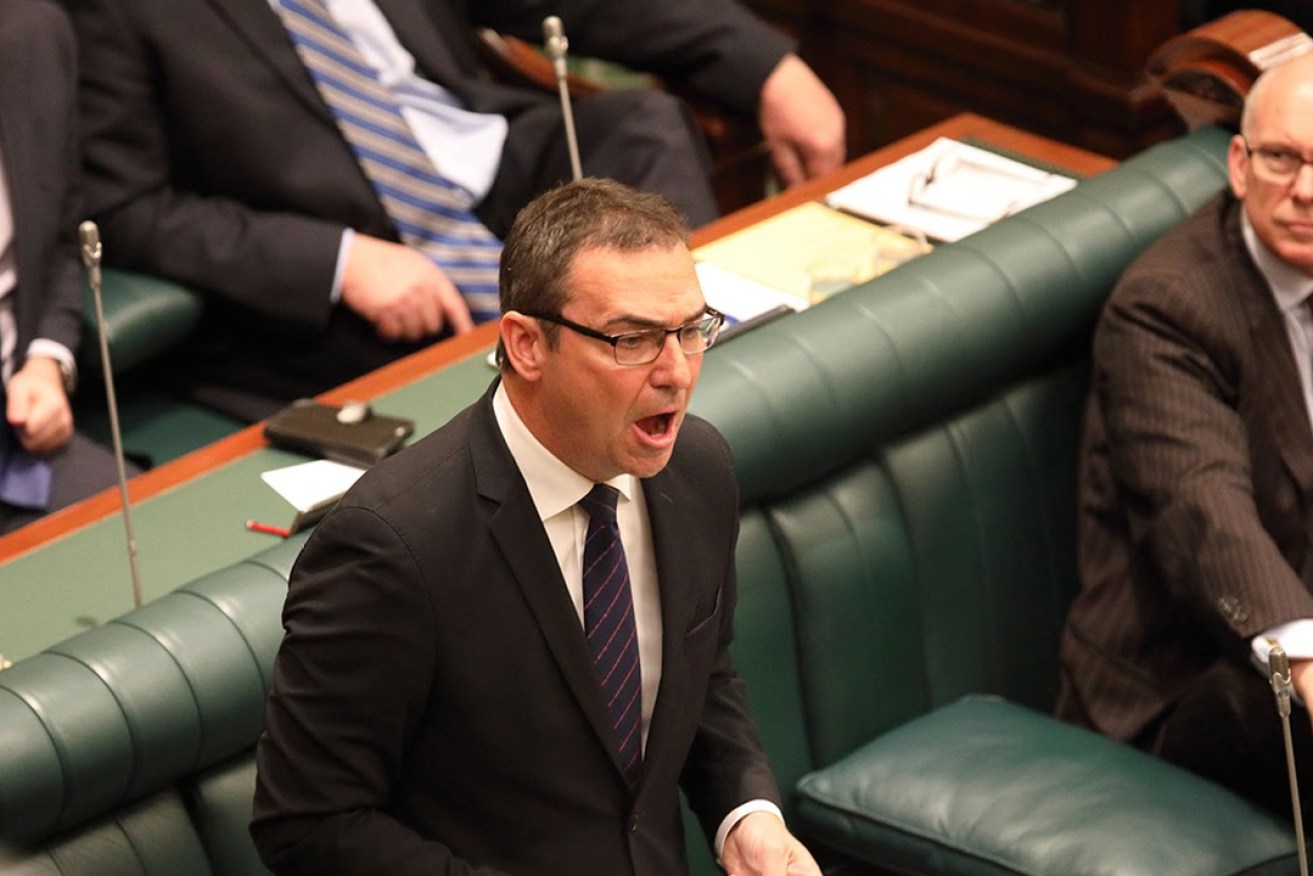Electoral fairness hijack ‘wouldn’t have survived a referendum’
The Weatherill Government is expecting a Liberal-led legal challenge after a late-night parliamentary coup which saw the contentious “fairness” provision stripped from the state’s Constitution Act.

Steven Marshall's state Liberals are furious at the scrapping of the fairness provision. Photo: Tony Lewis/InDaily
InDaily revealed this week that Greens MLC Mark Parnell had moved an amendment to a Government bill that sought to emphasise the “one vote, one value” principle in future electoral boundary redistributions.
That received short shrift on the Upper House crossbench, but – in a stunning turn of events – Labor last night dropped the main elements of its bill, instead forcing through Parnell’s amendments – removing the fairness clause that dictates boundaries be drawn to ensure the party with a statewide majority should have enough seats to govern.
In practice, this has rarely occurred since the clause was inserted in a 1991 referendum, with the Liberals having won only once outright in the years since – despite only having lost the popular vote once.
But the Opposition was apoplectic with the hijack – particularly after the Government revealed legal advice from the Solicitor-General that the clause could be removed without going to a referendum.
Asked if he expected a court challenge to the legislation, Liberal leader Steven Marshall said today: “Of course.”
“We’ll look at getting our own legal advice on it,” he told InDaily.
Attorney-General John Rau said he would be “totally unsurprised” if such a challenge occurred, but “our advice is it’s sound”.
Dr Matthew Stubbs, an associate professor at Adelaide Law School, told InDaily the provision in the Act that certain sections cannot be “repealed, suspended or amended” without a popular vote “is the basis for the expectation that a referendum would be required in order to remove the fairness provision”.
“However, the wording of [the section] is not as broad,” he noted.
He said certain legislative changes would “only require submission to a referendum if they alter one of the… matters listed there”, relating to the number of electors in each district, the frequency of redistributions and the principle that the electoral boundaries commission must remain “independent of political influence or control”.
“There is an argument that removal of the fairness provision would not affect any of these matters, and therefore does not require a referendum,” he said.
“Although this has not been previously tested, the government’s position that the fairness provision can be removed without a referendum has a good chance of being accepted if there were a challenge.”
But Marshall insists the Government provided no legal advice to support its move and “all the arguments put forward were spurious at best”.
The clause was inserted in a 1991 referendum with 649,906 voting yes, to 197,244 no.
Marshall said the Government’s move had rejected “the will of the people”.
“The fairness clause went to the people of SA and was confirmed by the people of SA,” he said.
“What Labor has done is essentially thumb their nose at the very people they’re seeking to vote for them in March.”
Parnell said “we were all taken a bit by surprise” to discover that “a referendum is not needed”.
“I was working on the assumption that whatever changes we made, we’d still need to go through the referendum process,” he said.
“But the state constitution is an Act of state parliament – we change provisions in state constitution all the time.”
He maintained the Fairness provision – which ABC psephologist Antony Green described as a “gerrymander” on Twitter overnight – was “an outdated clause”.
“I call it the unfairness clause.”
But he conceded it would have been unlikely to pass a referendum, given “the Liberals are vehemently opposed”.
“Unless you’ve got pretty much everyone on side they don’t pass, so it would be a really hard thing to convince the public,” he said.
“It would probably not have survived a referendum… the misinformation campaign that the Liberals would have run would have ensured it didn’t pass.”
Rau concedes his legal advice “did surprise me a bit”, given “the Fairness thing [was] wrapped up in the referendum years ago”.
“But the advice came back to me that [while] you could argue [a referendum was required], it’s unlikely that’s the case,” he said.
“It became clear to me we were definitely not going to get the numbers for our proposition, but there appeared to be a chance for Mark’s proposition getting up [so] I sought some fairly urgent advice.”
He said the clause was “a bit of an anachronism, in the sense that 30 years ago who’d have thought we’d have a minor party contest strongly in the lower house.”
So does that make this reform effectively the ‘Xenophon clause’?
“It is in a sense,” Rau concedes.
“But [the Fairness clause] assumed the two major parties are the only players in the game, and everyone else is irrelevant – that’s manifestly not the case,” he said.
“We are and have always been committed to the fair distribution of votes in state electorates… from one election to another that may favour one party or another – no two elections are the same.”




